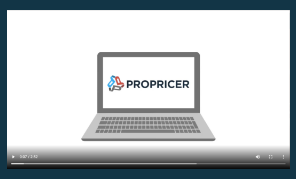It’s all about efficiency. Whether you’re a contracting firm or an agency contract management office, keeping lines of communication open with your counterpart during the pre-award phase can save time and prevent frustration on both sides.
Here are six suggestions for pre-award communications to expediently find your ideal contractor-contract match.
On the agency side
Filter your candidate base more incisively with pre-award surveys.
If you’re a DoD agency, know that the DCAA uses the pre-award survey to determine whether a contractor is reporting their accounting systems as efficiently and accurately as possible, and is following appropriate policies and procedures—before they’re awarded a contract. In short: are their financial systems accurate, relatively modern, and compliant?
The survey can be a powerful operational tool for filtering out contractor contenders who may not be up to speed on financials and compliance. It can also be a roadmap to a higher-performing company for the contractor.
In general, government contractors need to overcome many more regulatory hurdles than their traditional commercial peers, but this is also often what makes government contracting businesses exceptional.
You’ll know which contractors have an organized accounting approach, and more specifically, which ones are able to align themselves with the specific ways agencies expect to see accounting and reporting systems configured. The pre-award survey process also paves the way for a smoother audit later in the contract process, should your contractor require one. 1
Gain better economic deals through pre-award discussions.
Here, you’ve already established a competitive range for a proposal — or a shortlist of award contenders—and now you’d like your candidates to think about how they can be more economical in their pricing.
In essence, discussions are interactions where contractors can find places to add value while cutting costs, and agencies can negotiate for their best deal yet. Revisions or modifications to a proposal can be text edits, number changes, or any other amendments you see fit to request as an agency. 3
Determine past performance before you set a competitive range.
In this type of pre-award communication, you reach out to a contractor to clarify issues of past performance before placing them on a contract’s shortlist—or not. Was the contractor previously late in delivery? Was there agency miscommunication in terms of material requirements that might have hampered proposal submissions?
Make no mistake, these types of communications aren’t a chance for contractors to tweak or resubmit proposal elements. Rather, they’re your chance to clarify any performance questions or uncertainties on a past project before you set your competitive range on a current contract. 3
On the contractor side
Answer all Requests for Information and Requests for Quote.
Request for Information. Think of this pre-award communication as a market research tool, used by the GSA and SBA to canvas the SMB vendor community for pre-proposal feedback, and as a way to scout vendor sources.
Here’s how you win. Your response to this type of query can affect how either organization sees you as a candidate when you position yourself as a subject matter expert, a potential vendor source on an acquisition, or both. Also, once you respond, the potential contract in question can go into “set-aside status,” which means if you choose to submit a proposal for a resultant contract, you’re only competing against other SMBs. If no one answers the query, the resultant contract becomes “open,” and your competitive field becomes much stiffer—now contractors of any size can bid. 4
Request for Quote. This is a solicitation to submit a bid to fulfill a particular product or service that may or may not be part of a full contract.
You’ll generally receive a Request for Quote (RFQ) on a relatively lower-dollar procurement. It’s a way for your smaller business to open the door to an agency and learn some basic government contracting ropes in the process. RFQs aren’t legally binding as a contract until the agency signs the quote, or you begin related work.
Follow up on agency requests once your proposal is in.
Details, details. They can be tedious, but as a contractor, be sure you follow through on agency requests for more information or data clarification once you’ve submitted your proposal. And it’s a great idea to do it as quickly as you can.
For example, imagine you’ve submitted a contract bid and subsequently landed an introductory meeting with an agency. All looks promising. But afterward, through a pre-award communication, the agency asks for more details on a proposal topic. Believe it or not, numerous contractors will never get back to the agency. Don’t let that be you. Not only will you likely lose the contract, you’ll probably color the way that agency sees you during future opportunities. 2
Respond to contract modifications so you’re not bidding on obsolete terms.
Let’s say an agency has submitted an RFP for which you’re preparing a response, but then someone in the government—or even another contractor—rejects something about it. It’s not uncommon. In fact, today there are often several pre-award communication protests on large contracts.
You have to keep your eyes open and track the modifications the agency sends you, or you could respond to an outdated RFP with a proposal that’s a non-starter. And this should probably go without saying, but we’ll say it anyway: read every modification the government sends you, before signing and sending it back. You may think you know what the modification entails, but its content could be entirely different. Always know what you’re signing up for and keep yourself open to a contract win. 2
Be on the same proposal platform page as your agency partner.
Any agency will appreciate it if you ask what proposal pricing platform they’re using. They’ll appreciate it even more if you submit your bid in a compatible format. Many agencies today use ProPricer Government Edition to analyze proposal submissions through different lenses, compare various contractors’ submissions on the same RFP, and quickly bring up cost and pricing data on similar yet historical proposals for comparison.
When you submit a proposal that’s crafted in ProPricer Contractor Edition or our free-to-try ProPricer Contractor Edition - Essentials, you’re submitting in a format that’s compatible with what many government agencies use. Even if they’re not using ProPricer, they’ll be able to accept your files. And agencies usually do business with those who are easy to do business with—especially during the pre-award stage.
Our flagship event—Government Contract Pricing Summit — is back in-person and online, beginning June 14th-16th, and we can’t wait to see you there!
Registration is open, and whether you join us in San Diego or enjoy the digital experience from the comfort of home, you’ll learn from hundreds of fellow federal contract pricing professionals across all industries over three days at our hybrid event happening at the idyllic Sheraton San Diego Hotel & Marina.
Sources
- Lanigan Ryan Article: What is the Pre-Award Survey, and How Can it Improve a Government Contracting Business?
- Federal News Network Article: Advice for Contractors Who Want to Gain a Little More Control Over Their Fates
- Georgia Tech Enterprise Innovation Institute: Discussions vs. Clarifications vs. Communications
- GSA Solution Brief: How to Respond to Pre-Award Notices




